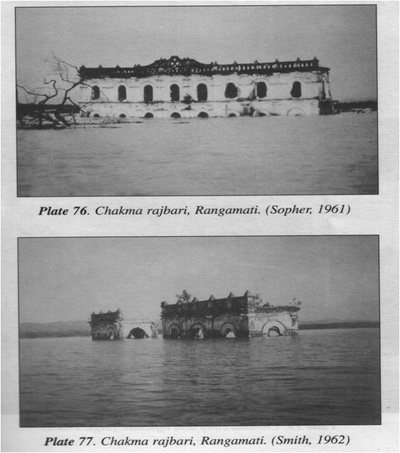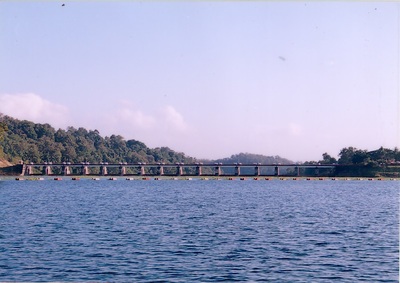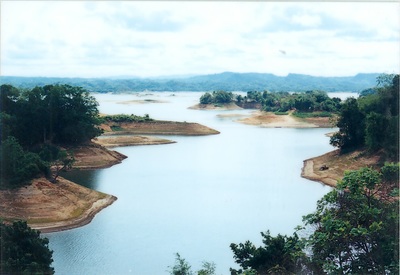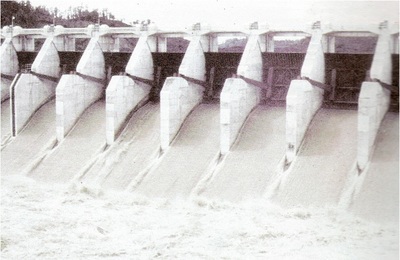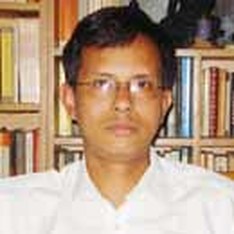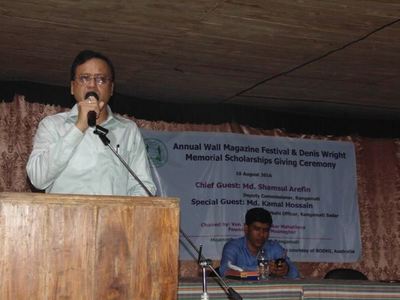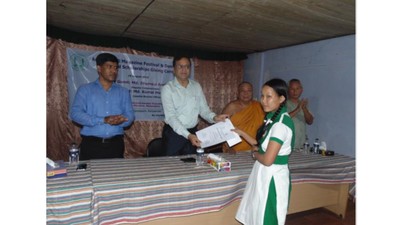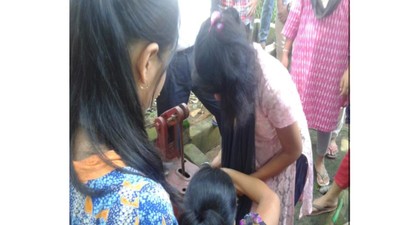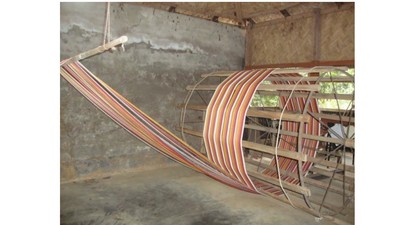|
Moanoghar (http://www.moanoghar.org/) was started in 1975, in the Chittagong Hill Tracts of Bangladesh, soon after that young nation's civil war, leading to the birth of Bangladesh, formerly East Pakistan.
Moanoghar provides formal education, vocational training, health services and support for the socio-economic development of its students in the area and of the wider community. Moanoghar also aspires to promote and preserve indigenous culture and to act as a symbol of communal harmony to the wider community. You could say that Moanoghar embodies the most peaceful and skilful aspirations of these oppressed people, as, in 1976, only a year after Moanoghar's formation, another civil war started in this part of the world, this time in the Chittagong Hill Tracts (CHT). Unlike the earlier war India did not intervene, again, however, the Bangladeshi government was successful. BODHI has supported Moanoghar for several years. In 2014-2015 (and extending to early 2016) Moanoghar became BODHI Australia's major recipient of financial assistance. |
The problems in this area far precede the civil wars. For a start, it would have been nice if the authorities who divided India at its 1947 partition could have included more of this territory, with its almost exclusively non-Muslim people and culture (at that time), outside the control of Muslim dominated West and East Pakistan. Then, in the early 1960s, the Pakistani government flooded one of the most fertile valleys in the CHT, to form the Kaptai lake (to generate hydro-electric power). See images above.
This led to the inundation of the capital city, Rangamati, and much cultural loss. It also led to the displacement of thousands of Jumma people, most of whom were given asylum in 1967 by then Indian Prime Minister Nehru, in Arunachal Pradesh, India. |
REPORT: 2016
A detailed 12 page report for the period April 2015 to June 2016 was received in early February, 2017, and is posted on line below. The total budget for this period was 11,48,072 taka (BDT) (almost A$20,000)
Highlights:
Mobile clinics: Almost 5,400 patients were seen in four different villages. One of these is open six days a week (07.30-17.00); others only on certain days and times. Of these patients, 51% were adult males, 43% adult females and the balance were children. A table of the treated conditions is in the report. Of interest, 7% were for intestinal parasitic illnesses [“tenia” (tapeworm) and “scariasis” (roundworm)] but only two patients (no children) were diagnosed with malaria. However, 16% were diagnosed with “viral fever” and another 6% had the common cold – another viral illness. Also notable is the frequency of diarrhoea (10%) and gastric problems.
Health promotion: 49 health awareness raising sessions, led by a female nurse health educator were conducted, reaching almost 700 people, of whom two thirds were women. These sessions focused on safe drinking water and sanitation; childhood vaccinations (including advice where they are available); hygiene and maternal care (pre-natal, natal and post natal).
Three Denis Wright Memorial Scholarships were awarded to female students on August 18, 2016, at a ceremony overseen by Ven. Shraddhalankar Mahathera, a founding member of Moanoghar. These were for academic excellence (Tk. 30,000); academic improvement (Tk. 15,000) and academic inspiration (Tk. 5,000). The recipient of this was Banashree Chakma, in Class VIII, awarded “in recognition of her strong determination in her studies. She came from a very much marginalised background. Despite all odds, she is determined to continue her education at Moanoghar”. These scholarships are in memory of the late Dr Denis Wright, an expert on Asian history who specialised in Bangladesh and who is a much-missed director of BODHI (1993-2013).
The report noted that “these scholarships have inspired recipients and dared them to dream for their future. Former recipients are now pursuing higher education in the university. This memorial scholarship should be treated as one of the best examples for making a difference in society.”
A detailed 12 page report for the period April 2015 to June 2016 was received in early February, 2017, and is posted on line below. The total budget for this period was 11,48,072 taka (BDT) (almost A$20,000)
Highlights:
Mobile clinics: Almost 5,400 patients were seen in four different villages. One of these is open six days a week (07.30-17.00); others only on certain days and times. Of these patients, 51% were adult males, 43% adult females and the balance were children. A table of the treated conditions is in the report. Of interest, 7% were for intestinal parasitic illnesses [“tenia” (tapeworm) and “scariasis” (roundworm)] but only two patients (no children) were diagnosed with malaria. However, 16% were diagnosed with “viral fever” and another 6% had the common cold – another viral illness. Also notable is the frequency of diarrhoea (10%) and gastric problems.
Health promotion: 49 health awareness raising sessions, led by a female nurse health educator were conducted, reaching almost 700 people, of whom two thirds were women. These sessions focused on safe drinking water and sanitation; childhood vaccinations (including advice where they are available); hygiene and maternal care (pre-natal, natal and post natal).
Three Denis Wright Memorial Scholarships were awarded to female students on August 18, 2016, at a ceremony overseen by Ven. Shraddhalankar Mahathera, a founding member of Moanoghar. These were for academic excellence (Tk. 30,000); academic improvement (Tk. 15,000) and academic inspiration (Tk. 5,000). The recipient of this was Banashree Chakma, in Class VIII, awarded “in recognition of her strong determination in her studies. She came from a very much marginalised background. Despite all odds, she is determined to continue her education at Moanoghar”. These scholarships are in memory of the late Dr Denis Wright, an expert on Asian history who specialised in Bangladesh and who is a much-missed director of BODHI (1993-2013).
The report noted that “these scholarships have inspired recipients and dared them to dream for their future. Former recipients are now pursuing higher education in the university. This memorial scholarship should be treated as one of the best examples for making a difference in society.”
Income generation: bamboo and coconut plantation, sewing and weaving
Moanoghar owns some fallow hilly land on which 200 bamboo stumps and 150 coconut palms were planted, aiming to generate some income, other than donations (see picture). About 25 female students received training in weaving and sewing.
Water supply: repair, new wells and training
Moanoghar’s water supply system was repaired, using funds held over from 2014-5. In addition, senior students received training on the maintenance of tube wells and water faucets, to improve self-reliance. Two ring wells were also dug within the campus, to enhance water security.
Budget
BDT %
Health (including salary support) 522,900 45.5
Denis Wright Scholarships 55,000 4.8
Handloom 146,000 12.7
Coconut and bamboo plantation 98,000 8.5
Administrative expenses (including audit) 26,672 2.3
Stipend (3 carefully selected students) * 124,000 10.8
--------- -----
Total 1,148,072 100
* the moving story of these students is to be published, soon .. but not their identities (also see below, re HELP).
BDT %
Health (including salary support) 522,900 45.5
Denis Wright Scholarships 55,000 4.8
Handloom 146,000 12.7
Coconut and bamboo plantation 98,000 8.5
Administrative expenses (including audit) 26,672 2.3
Stipend (3 carefully selected students) * 124,000 10.8
--------- -----
Total 1,148,072 100
* the moving story of these students is to be published, soon .. but not their identities (also see below, re HELP).
| annual_progress_report_to_bodhi_apr_2015_aug_2016_original.pdf |
Moanoghar have established a scholarship fund called HELP (Higher Education Loan Program). Scholarship recipients are expected to pay back through HELP when they are employed, thus enabling future students to also be assisted. Over 80% of Moanoghar graduates are repaying their community in this way.
